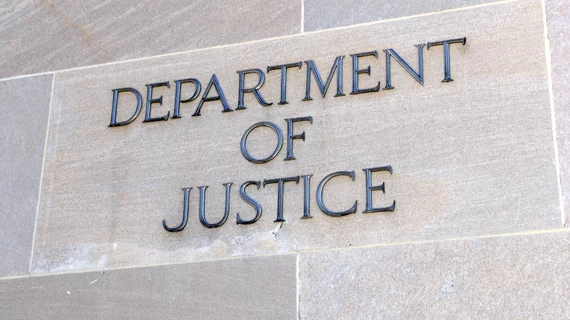DOJ collects $1.9B from healthcare in 2023, with imaging provider making 1 of the biggest payouts
The Department of Justice collected nearly $1.9 billion in judgments and settlements from healthcare providers last year, including a hefty payout from one imaging provider.
The number represents a more than 135% increase from the $803.3 million collected from providers in 2022. Authorities declined to intervene in about $442.3 million worth of cases, down sharply from the $1.19 billion figure in 2022.
Nashville-based law firm Bass, Berry & Sims gathered this information for its annual Healthcare Fraud & Abuse Review, published on Wednesday. Attorneys filed 700 such qui tam lawsuits last year, with a few key areas of focus.
“The government and whistleblowers remain keenly focused on alleged violations of the Anti-Kickback Statute and alleged violations of the False Claims Act involving managed care," Brian D. Roark, co-chair of the Bass, Berry & Sims Healthcare Fraud & Abuse Task Force, said in a Feb. 28 announcement . "Individuals and entities in the healthcare industry should expect continued focus in these areas in the coming year.”
Bass, Berry highlighted a handful of cases last year that pertained to medical imaging, including:
- In March, Diagnostic Imaging Associates and Doctors Community Medical Center, both in Maryland, agreed to pay over $2 million to settle allegations they violated the FCA. The two had a long-standing pact whereby the radiology group would bill CMS using its own assigned provider number. It did so for both the professional services provided by DIA along with the technical component, rendered at the hospital’s outpatient cancer screening facility. However, the breast center was not enrolled in the two federal payment programs and should not have entered these arrangements.
- In September, New York cardiologist Klaus Rentrop, MD, agreed to pay $6.5 million and relinquish ownership of his cardiology practice, Gramercy Cardiac Diagnostic Services, for participating in a complex kickback scheme between 2010 and 2021. According to authorities, the cardiologist had office space rental agreements with other medical practices and independent contractor agreements with dozens of individual cardiologists. The medical practices would refer patients to the independent cardiologists, who would then refer those same patients to Gramercy Cardiac to undergo PET and SPECT scans. The practices and independent cardiologists all received kickbacks for their participation in this scheme, often in the form of large “rental payments.”
- Also in September, Cigna agreed to pay $172,294,350 to settle allegations that it violated the FCA, including submitting diagnosis codes unsupported by necessary medical imaging. Under the Medicare Advantage program, the Bloomfield, Connecticut-based insurer would purportedly base such diagnoses on in-home patient assessments of beneficiaries typically conducted by nurse practitioners. These NPs would often diagnose serious, complex conditions without the necessary medical imaging or diagnostic tests to reach such conclusions, the DOJ said.
- In October, Illinois-based Cardiac Imaging Inc. and its CEO, Sam Kancherlapalli, agreed to pay $85 million to settle allegations that they used illegal referrals to bilk the Medicare program. The alleged kickback scheme spanned over nine years ending in May 2023, with CII paying cardiologists $500 or more per hour to supervise PET scans for patients whom they had referred to the company. However, these fees “substantially exceeded fair market value,” often including time when the referrers were not on site during the exams. This marked the largest payout among providers grouped into the “Laboratory, Pathology, Radiology and Diagnostics” category, according to Bass, Berry.
Along with the Anti-Kickback statute, the analysis also highlights other hot button issues for providers to monitor, including the False Claims Act’s intersection with cybersecurity concerns and the Controlled Substances Act.

